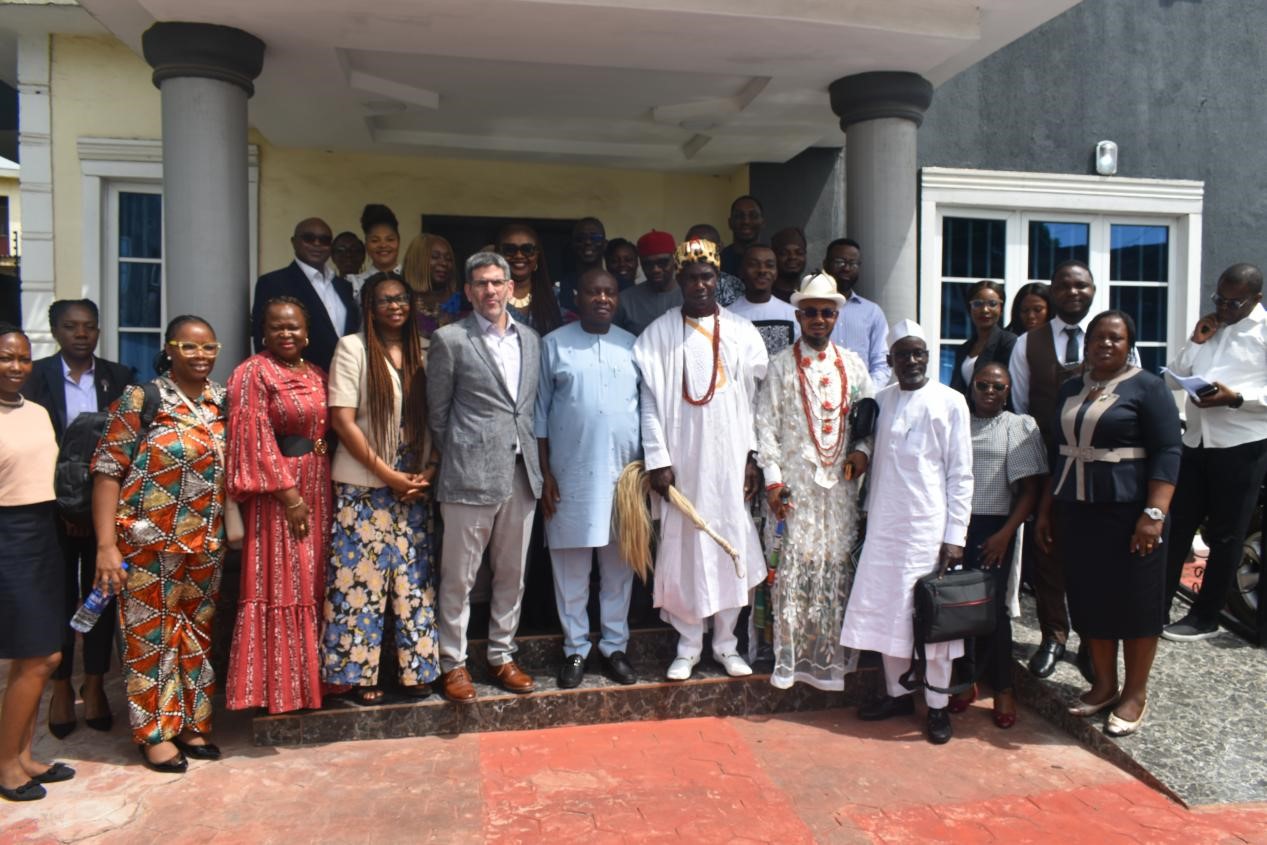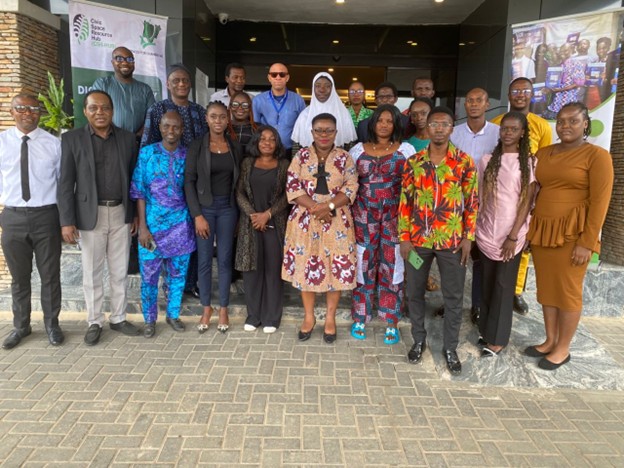
Spaces for Change | S4C joined stakeholders in the Nigerian petroleum industry to welcome Ford Foundation’s Vice President (VP) of International Programs, Martin Abregu, to Nigeria at a roundtable held at the organization’s headquarters in Lagos on April 3, 2024. S4C and Ford Foundation grantees working on extractive justice organized the roundtable on the Host Community Development Trusts (HCDTs) coinciding with VP Martin’s visit. The roundtable brought together 35 stakeholders comprising federal lawmakers, policymakers, civil society organizations, host community representatives, industry regulators, oil companies, and the state government, to discuss strategies for closing the gaps affecting the implementation of the HCDTs in Nigeria. This roundtable comes on the heels of S4C’s latest report, titled, “Transitioning from GMOUs to HCDTs“ which examined the extent to which indigenous and international petroleum companies are fulfilling their legal obligations to deliver social and economic benefits to oil-producing areas in Nigeria through the HCDTs.
Nigeria’s Petroleum Industry Act 2011 introduced the HCDTs as a benefit-sharing mechanism for facilitating equitable distribution of natural resource benefits to the oil-rich areas. Independent analysts have estimated that host communities could potentially gain between 500 to 600 million dollars annually from the 3% Operating Expenditure (opex) contribution from oil companies under the HCDTs framework. Despite these laudable gains, what gaps currently hinder the equitable distribution of the benefits from natural resources to the oil-producing regions? Stakeholders identified key challenges hindering the provision of social and economic benefits to oil-bearing communities and the strategies for overcoming them from a multisectoral perspective. The litany of challenges identified include the lack of community involvement in the Board of Trustees’ selection process, imposition of candidates either by oil companies or traditional rulers, ambiguity surrounding the 3% Opex calculation, power asymmetry in decision-making favoring corporations, divestments lacking environmental accountability, reprisals for speaking up, absence of monitoring mechanisms, and policy gaps.
Ford Foundation’s partners in Nigeria—such as BudgIT, SERAP, CSR-in-Action, Kebetkache Women, Accountability Lab, SDN, PIND and Global Rights—have rolled out several initiatives aimed at bridging the gaps in the effective implementation of HCDTs ranging from community outreaches, the establishment of multistakeholder platforms, examining budgetary provisions of agencies affiliated with HCDT implementation such as the Oil Mineral Producing Areas Development Commission (OMPADC), NDDC, the 13% derivation from the Ministry of Niger Delta Affairs, Nigerian Content Development and Monitoring Board (NCDMB), review of previous regional development interventions and corporate social responsibility initiatives of oil companies, production of a handbook to operationalize the HCDT process at the community level and support on-the-ground implementation, and so forth. These interventions not only empowered local communities, but also resulted in the establishment of fully-incorporated trusts, Board of Trustees, and Management Committees as required by law.
Likewise, parliamentary bodies in Nigeria are also taking steps to bridge the gaps in HCDT implementation. The House of Representatives’ Committee on Host Communities recently unveiled its Strategic Plan 2023-2027, outlining strategies for ensuring the effective implementation of PIA provisions related to host communities’ development and well-being. Honorable Dumnameme Dekor, Chairman of the House of Representatives’ Committee on Host Communities highlighted the collaboration between the Committee and Spaces for Change, resulting in engagements such as the Technical Session held in November 2023 to address the ambiguity surrounding the 3% Operating Expenditure (Opex) and the lifting the burden of Section 257(2) of the Petroleum Industry Act (PIA) pertaining to communities forfeiting their benefits in cases of sabotage and pipeline vandalism.
Commending Spaces for Change’s sustained advocacy and commitment to engaging industry stakeholders, the Chairman acknowledged that the proposed new guidelines by the Nigerian Downstream and Midstream Regulatory Authority (NMDPRA) represent one of the results of the organization’s consistent engagement and interactions with oil corporations and industry regulators. He also expressed gratitude to the Ford Foundation for supporting Spaces for Change to deliver on these results. While stressing the need for increased focus on HCDT implementation, he reiterated the Committee’s commitment to partnering with Spaces for Change and other civil society organizations to steer rights-based policy reforms that can improve the wellbeing of host communities in the Niger Delta region.
Traditional rulers, chiefs and representatives of host communities joined the moderated panel discussions, updating on the progress of HCDT implementation in their respective communities. While international and indigenous oil companies have, indeed, incorporated HCDTs in several communities in the Nigee Delta, some operational challenges remain. From Aguleri (Anambra State) to Assa (Imo State) to Ibeno (Akwa Ibom State) to Ogoni (Rivers State), lingering concerns range from incessant community disputes, non-transparent governance processes, underrepresentation of women in resource governance structures and spikes in divestment from major fossil fuel extraction projects without environmental accountability following decades of damage to community lands, streams, mangroves and ecosystems. Due to the prevalence of community disputes, oil companies like SEPLAT prioritize conflict-sensitive engagement by expanding the targeted beneficiaries of their HCDT programs to accommodate both the oil-rich and adjoining impacted communities.
VP Martin Abregu, accompanied by the Ford Foundation delegation comprising the Regional Country Director and the executives of their West Africa office, highlighted how the various issues raised during the roundtable align with the Ford Foundation’s broader objectives of reducing inequality, addressing climate change and promoting transparency and accountability in natural resource governance. The discussions around equitable benefit-sharing and the role of diverse stakeholders in making that happen, demonstrate the imperativeness of unrestricted democratic spaces and multistakeholder collaboration. Likewise, the closing remarks by Ford Foundation’s country director commended the resilience of groups like Spaces for Change, thriving under pressure from various aspects of the petroleum industry. She reiterated the Ford Foundation’s commitment to social justice and a good quality of life in the host communities. Along this line, addressing issues of natural resources and climate change will remain part of the Foundation’s core objectives in the next five years. Roundtable discussions like this offer diverse stakeholders in the petroleum industry a vital platform for knowledge exchange, experience sharing, and strategic deliberations towards a common goal: host community development.



